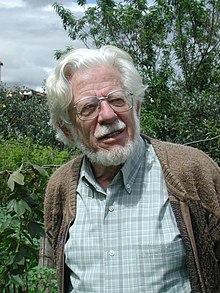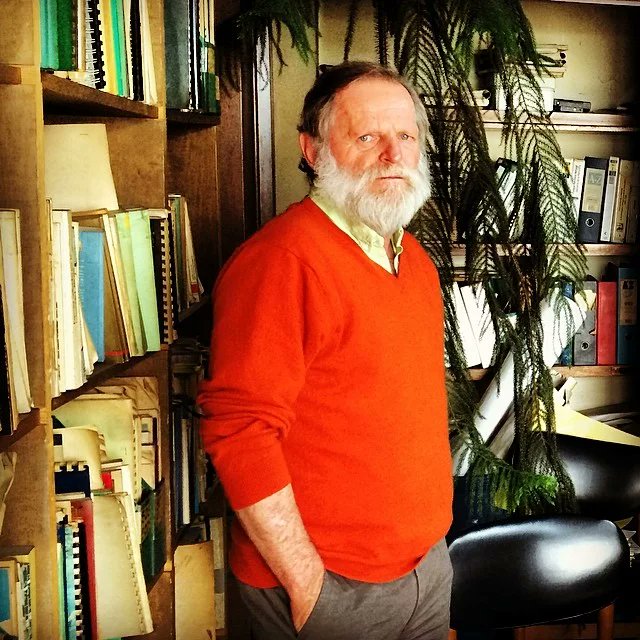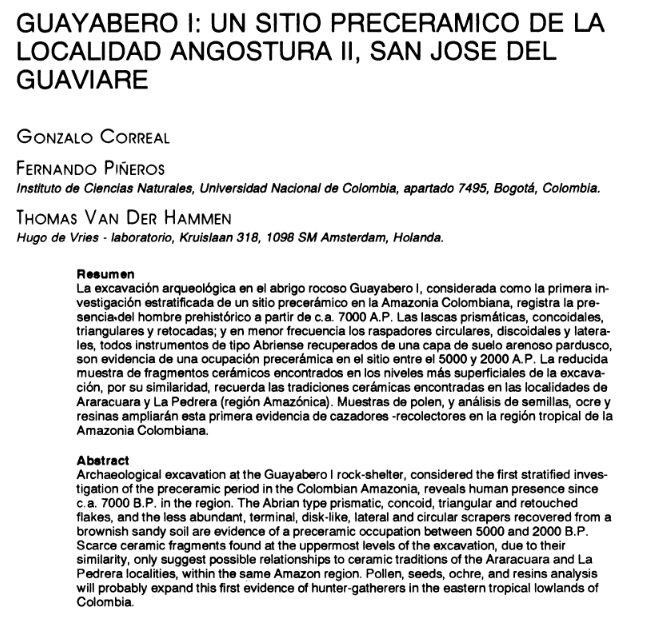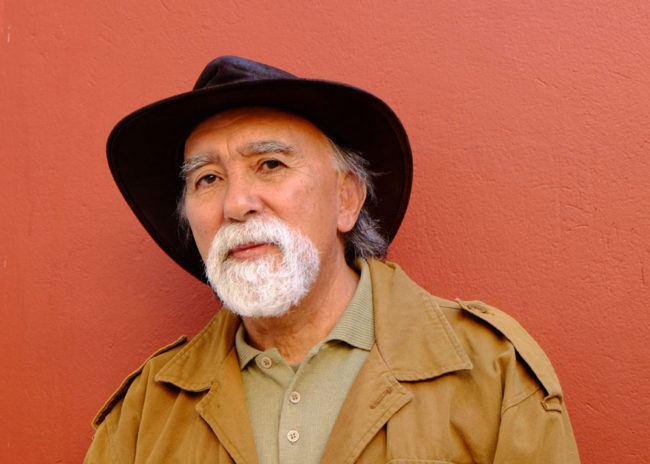Ok people, the current hype in #Science around #Archaeology research in #Chiribiquete and #LaLindosa in #Colombia, albeit deserving, it's a clear example of how scientific discovery is colonised and monopolised. We need to have an awkward conversation 1/n https://observer.com/2020/11/prehistoric-rock-art-discovered-colombia-8-miles-long/
As a Colombian expat in #Science, I was always surprised with how places like Chiribiquete were pretty much unknown overseas, considering their scientific, cultural and biological value, and that almost any Colombian has heard about them 2/n
The last couple of weeks I started an increasing trend of people in "developed countries" talking about discoveries of ancient paintings in the Amazon, and managed to trace back the source to this paper from April 3/n https://www.sciencedirect.com/science/article/abs/pii/S1040618220301907
As people started reacting more and more to it, media coverage started popping up. At that point a narrative was clear: A British-led expedition just discovered a trove of paintings from the heart of the Colombian Amazon 4/n https://news.artnet.com/art-world/colombian-amazon-ice-age-rock-paintings-1927407
The discovery was so F&%$ unbelievable that they kept it under the wraps until a @Channel4 documentary was shot and produced to be released later this month 5/n https://www.smithsonianmag.com/smart-news/tens-thousands-12000-year-old-rock-paintings-found-colombia-180976427/
By now I'm just gobsmacked in disbelief: Colombians have known, researched and fought to preserve this site for decades. Let alone indigenous communities that even today (after millennia) have a direct connection with those sites. What the actual f&%$!? 6/n
You would argue that it's the language barrier to blame, but this happened not only for outlets in English, even @CNNEE that could have easily read and reached to Spanish-speaking sources sold the same narrative 7/n https://cnnespanol.cnn.com/video/descubrimiento-pinturas-rupestres-edad-hielo-amazonas-universidad-exeter-serrania-la-lindosa-colombia-fauna-requena-panorama-cnne/
So although I have very limited knowledge on the background history of the "discovery" of Chiribiquete and La Lindosa, here's a bit of vindication to the hundreds of people that have given their lives (literally and metaphorically) 8/n
@ccastanouribe is arguably the person who brought Chiribiquete and La Lindosa into the scientific sphere more than 30 years ago while he was the director of @ParquesColombia (National Parks Colombia) 9/n
Other researchers like Patricio von Hildebrand and Thomas van der Hammen spent decades living and exploring such sites uncovering their biological and archaeological richness 10/n
Multiple expeditions have been completed over the decades, efforts have been made to declare it a national park, then expand it (to almost 43,000Km2), and even in 2018 it was freaking declared world heritage by @UNESCO! 11/n
For decades it remained unreported to protect the sites and uncontacted communities that live in the area. As it became public, #LaLindosa was opened to the public as an archaeological park in a way to divert people from damaging #Chiribiquete, that remains closed 12/n
This has always been difficult territory. From the time they initially reported the sites, armed groups have been under control of the region, forcibly displacing indigenous communities, researchers and conservationists 13/n
The worst fears became true and as it grew in popularity, deforestation and forced displacement soared, creating a hostile environment for locals, researchers and conservationists 13/n https://www.insightcrime.org/news/brief/park-rangers-colombia-amazon/
Anyway, hopefully someone from #CienciaCriolla that knows the story way better than I am will jump in to correct me and add what I've missed. If you're curious about our version of the story, here's a thread of sources to finish this off 14/n
This is a great interactive special by @RevistaSemana with great interviews to some of the researchers involved: https://especiales.semana.com/deforestacion/chiribiquete.html
This is an excellent documentary following one of the most recent expeditions by Colombian researchers by @RTVCco that's available on @RTVCPlay https://www.rtvcplay.co/series-documentales/colombia-bio/chiribiquete-videografia-expedicion-al-centro-del-mundo-director
This is a fantastic talk by @maria_mimia, Colombian investigative journalist and @ccastanouribe's daughter
Last but not least, last year @ccastanouribe published with @mesaestandar a book everyone interested in Chiribiquete and La Lindosa should read https://www.mesaestandar.com/chiribiquete
Forgot to mention that the two first authors of the study behind all the hype are actually Colombian researchers from @UNALOficial and @UdeA but are vastly ignored in most of the coverage, with exceptions like (you guessed it)... a Colombian outlet https://www.eltiempo.com/vida/ciencia/arte-rupestre-revela-fauna-de-la-edad-de-hielo-en-serrania-la-lindosa-552431
With this, I leave with this quote from "The solitude of Latin America" by Gabo: "The interpretation of our reality through patterns not our own, serves only to make us ever more unknown, ever less free, ever more solitary"
Since this seems to be getting some traction, I'll keep adding bits and pieces. It is also worth noting that while we discuss this issue, La Lindosa is surrounded by human induced fires and expanding deforestation, losing over 1000 ha of forest https://caracol.com.co/radio/2019/03/05/regional/1551796657_196999.html
Here's some early work by Colombian researchers and Thomas van der Hammen on La Lindosa from 1990
https://www.jstor.org/stable/44241948?seq=1#metadata_info_tab_contents
https://www.jstor.org/stable/44241948?seq=1#metadata_info_tab_contents
Just this year I was able to track at least three scientific papers describing new species from Chiribiquete 1/3:
By Jacquelyn A. Kallunki https://link.springer.com/article/10.1007/s12228-020-09625-w
By Jacquelyn A. Kallunki https://link.springer.com/article/10.1007/s12228-020-09625-w
Just this year I was able to track at least three scientific papers describing new species from Chiribiquete 2/3:
By Lima ( @unicampoficial), Urbano-Bonilla and Prada-Pedreros (both from @UniJaveriana) https://onlinelibrary.wiley.com/doi/full/10.1111/jfb.14267?casa_token=8sRxVhwIKNoAAAAA%3AqejXliatb-nGitet_nV6BetIy_2c4e9X_wg5STEkAp--2_rjbuNjMiSJB_cpXCUWdQBrSuJu5CEhW2Ix
By Lima ( @unicampoficial), Urbano-Bonilla and Prada-Pedreros (both from @UniJaveriana) https://onlinelibrary.wiley.com/doi/full/10.1111/jfb.14267?casa_token=8sRxVhwIKNoAAAAA%3AqejXliatb-nGitet_nV6BetIy_2c4e9X_wg5STEkAp--2_rjbuNjMiSJB_cpXCUWdQBrSuJu5CEhW2Ix
Just this year I was able to track at least three scientific papers describing new species from Chiribiquete 3/3:
By García-Alzate et al. https://onlinelibrary.wiley.com/doi/full/10.1111/jfb.14319
By García-Alzate et al. https://onlinelibrary.wiley.com/doi/full/10.1111/jfb.14319
By 2019 there were over 1600 species reported in #Chiribiquete as part of the #ColombiaBIO expeditions. 57 of them new to #Colombia and 28 possibly to science https://www.eltiempo.com/vida/medio-ambiente/mas-de-1-600-especies-registradas-en-el-parque-natural-chiribiquete-361154
This is a great thread by @natbrusgaard on a completely different take on this, focusing on the science of the original study https://twitter.com/natbrusgaard/status/1334132916499206144
@tegwe_chan Pointed out the importance of Fernando Urbina's work on this topic. Here's a piece (in English!) on his work by @citypaperbogota
https://thecitypaperbogota.com/features/fernando-urbina-and-the-conquest-of-rock-art/21013
https://thecitypaperbogota.com/features/fernando-urbina-and-the-conquest-of-rock-art/21013
Hi again! Ok, I'm terrible on social media, so wasn't expecting this would blow out like this. Hopefully you're still reading as I will continue with my vindications! Thread continues

As I mentioned, I'm no expert. Still, I'm trying to piece more info together. @martinporr brought to my attention a statement by @Gipricolombia (working on #LaLindosa for years) on the recent hype:
https://www.facebook.com/gipri.colombia.7/posts/10157449603472096
https://www.facebook.com/gipri.colombia.7/posts/10157449603472096
I also noticed that @guardian updated their story addressing this issue. I personally think the warning at the end is more telling than the new version of the piece (still no mention of the names of Colombian researchers and institutions involved in the study), but hey!
I should also note that @LittleMsFossil (presenter of @Channel4's upcoming documentary) also took the time to comment on this, which I appreciate. Can't discuss the documentary, but hopefully the narrative will be different, looking forward to watching it! https://twitter.com/LittleMsFossil/status/1334529297483259908
This thread by @LittleMsFossil also touches on a range of insightful points to consider that make me want to watch the documentary even more! (don't know how from where I am) for sure is a story worth telling to get people everywhere to know about it! https://twitter.com/LittleMsFossil/status/1334634480385093638
But here I should say that you also have your average Latino reading and watching, and although I only speak for myself, I know part of the Colombian and Latino audience feels ignored with the kind of reporting we've seen so far (your documentary aside as it hasn't aired)
#CienciaCriolla we're also here and we're also watching
Anyone interested in #Chiribiquete and its' "discovery"? Here's a great interactive map by @AmazonTeamOrg and @Banrepcultural of Richard Evans Schultes' travels, an ethnobotanist from the US that documented the area in the 1940's with help from locals https://www.banrepcultural.org/schultes/

 Read on Twitter
Read on Twitter






